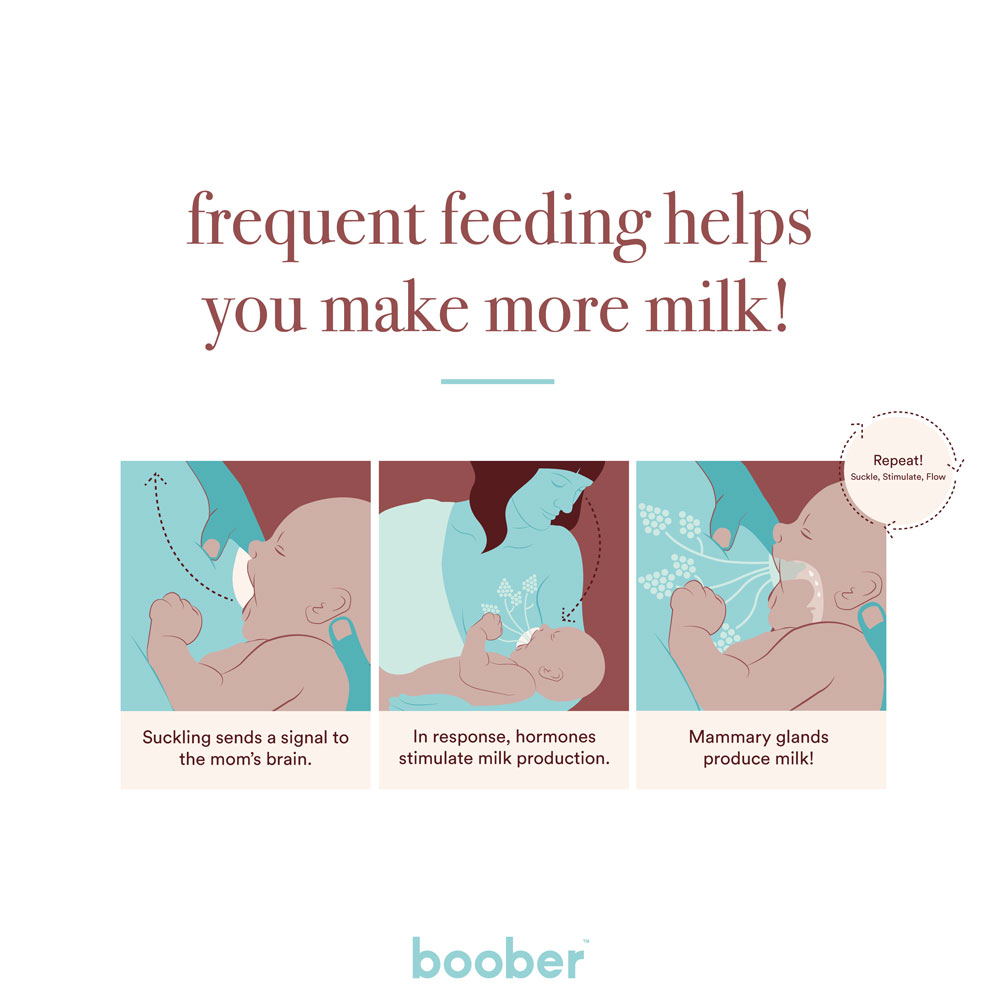How to Boost your Milk Supply when you’re Home on your Own?
By Jada Shapiro, founder of boober

Are you a breastfeeding parent at home alone trying to figure out how to increase your milk supply? This is a concern for many parents whether or not they are in the middle of a pandemic, like COVID-19. There are many things that can affect whether we are making enough breastmilk. What are the best things to do if you know you are not making enough for your baby or when you notice that your supply is starting to dip?
Assess whether you really have a breastmilk supply problem in the first place. Many people concerned they have low supply are actually producing a normal and healthy amount of breastmilk. If your baby is gaining weight well, you probably do not have a supply problem. How your breasts feel, how often you feed, whether you experience a let-down or not, how much you pump, etc. are not accurate ways of knowing whether or not you are making enough milk for your baby. If you do have low milk supply, here’s a bunch of tips and tricks to try:

- Breastfeed more frequently. More milk out means more milk made. Anytime you are concerned your milk supply is lessening, nursing more often should increase your supply. If you have added in some bottle feedings to your day, try going back to some nursing sessions.
- Assess your latch. An effective latch allows your baby to get what they need and allows your breast to be stimulated enough to produce sufficient milk. If your supply is going down despite frequent feeding and pumping, it is time to connect with a lactation consultant who can suggest adjustments in positioning, latch, and pumping that can really make all the difference.
- Pump a few times throughout your day. Pump a few times per day for several days after a nursing session and for two to five minutes past when your milk stops flowing. Remember, the more milk you remove from your body, the more you will begin to make. This can take a few days to start to see a difference.
- OR Try power pumping. Also known as cluster pumping, you are essentially trying to mimic how babies cluster feed which signals your body to make more milk. Take an hour each day for a few days and pump for 20 minutes, rest for 10 minutes, pump for 10, rest for 10, pump for 10. Repeat the next few days.
- Are you getting enough sleep? We know this is easier said than done, but sleeping at least 8 hours in a 24-hour period can help, so try to prioritize your napping and sleep for a few days. We make the most milk overnight. Remember, your eight hours of sleep will include naps during the day.
- Prioritize skin-to-skin contact: Provided you are not being advised to avoid skin contact with a COVID-19 infection, get that baby naked, take off your bra, and have some skin-to-skin time. It not only increases bonding, but it also increases the hormones that make milk and the ones that make us feel good, like oxytocin. Some people call this “taking a nursing vacation” and many lactation consultants recommend that you try committing to spending 24-36 hours where you do nothing but nurse, hang out with your baby, rest, eat and repeat.
- Are you eating enough? It’s easy to forget to feed yourself when you are focused on feeding your little one! People exclusively breastfeeding need around 500 calories more than they consumed before they were pregnant. Feeding yourself creates the breastmilk building blocks, so be sure to eat well and frequently.
- Try lactogenic foods: If you are feeding frequently and your latch is good, many people share that eating the following foods and supplements helps boost their supply:
- Oatmeal, millet, and other nutritive whole grains
- Nuts and seeds
- Supplements or herbs like Brewer’s Yeast, moringa, and turmeric (people should confirm with their doctor that there are no medical contraindications to their consumption of certain herbs, vitamins, and supplements)
- “Lactation foods,” tinctures, and teas.
Note: These are tips for boosting a slowly declining milk supply. If your supply has suddenly dropped off, we highly recommend working with a lactation consultant. Sometimes this represents something more serious, like tongue-tie, an insufficient amount of glandular tissue, a hormonal issue, or something else. With breastfeeding, time is of the essence. Book help now.
Remember, building your milk supply is about finding what works for your body and your baby, so try some different approaches until you figure out what works for you!